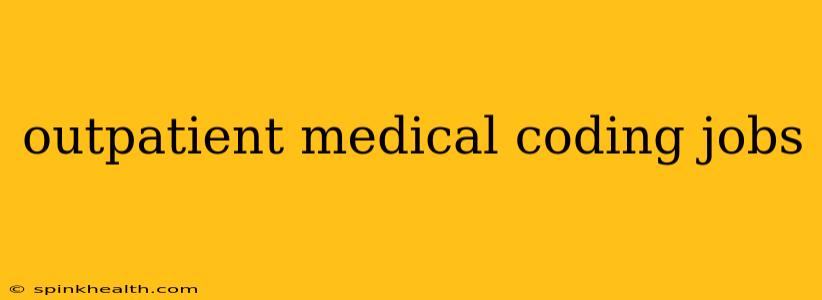Decoding the World of Outpatient Medical Coding: A Career Deep Dive
The bustling world of healthcare is constantly evolving, and behind the scenes, a critical role ensures smooth operations: the outpatient medical coder. This isn't just about numbers; it's about translating medical encounters into a universal language that insurance companies and healthcare providers understand. It's a fascinating field demanding precision, attention to detail, and a genuine interest in medicine. This deep dive explores the world of outpatient medical coding jobs, revealing what they entail, the skills required, and the exciting career paths available.
Imagine this: a patient walks into a clinic for a routine checkup. The doctor examines them, orders tests, and provides recommendations. But how does the clinic get paid? This is where you, the outpatient medical coder, come in. You take the medical record – the doctor's notes, lab results, diagnoses, and procedures – and translate it into specific alphanumeric codes using established systems like ICD-10-CM (International Classification of Diseases, 10th Revision, Clinical Modification) and CPT (Current Procedural Terminology). These codes are then submitted to insurance companies for reimbursement.
This process is far from simple. It requires a keen eye for detail, the ability to decipher medical jargon, and a deep understanding of medical terminology and anatomy. But the rewards extend beyond a stable career; you're playing a crucial role in the healthcare system, ensuring providers receive fair compensation for their services.
What are the day-to-day tasks of an outpatient medical coding job?
A typical day for an outpatient medical coder can involve a variety of tasks. It's not just about crunching numbers; it requires a strong understanding of medical practices. You might find yourself:
- Reviewing medical records: This involves carefully examining patient charts, ensuring all the necessary information is present and accurate for coding.
- Assigning ICD-10-CM and CPT codes: This is the core of the job – translating the medical information into standardized codes. Accuracy is paramount here, as incorrect codes can lead to payment delays or denials.
- Querying physicians: Sometimes, the information in the medical record isn't clear enough for accurate coding. You'll need to ask clarifying questions to ensure correct coding.
- Maintaining accurate records: You need to maintain meticulous records of your work, ensuring compliance with regulations and internal guidelines.
- Staying up-to-date: Medical coding is a constantly evolving field. Regular training and continuing education are essential to stay current with changes in coding guidelines and regulations.
What skills are necessary to be successful in an outpatient medical coding job?
The successful outpatient medical coder possesses a unique blend of hard and soft skills.
- Medical terminology knowledge: A solid understanding of medical terms and anatomy is essential to interpret medical records accurately.
- Coding expertise: Proficiency in ICD-10-CM and CPT coding is crucial. Knowledge of other coding systems may also be advantageous.
- Attention to detail: Errors in coding can have serious consequences, so meticulous attention to detail is a must.
- Analytical skills: You'll need to analyze medical records, identify relevant information, and apply appropriate codes.
- Problem-solving skills: You'll encounter situations where the information in the record isn't clear. Effective problem-solving skills are essential to resolve these issues.
- Communication skills: Effective communication with physicians and other healthcare professionals is necessary for clarification and to ensure accuracy.
What is the typical salary range for outpatient medical coding jobs?
The salary for an outpatient medical coder varies depending on experience, location, and employer. However, entry-level positions typically offer a competitive starting salary with opportunities for advancement. Experienced coders with specialized knowledge can earn significantly more. This is a field that values ongoing learning and professional development, leading to increased earning potential over time.
What education and certification are needed to become an outpatient medical coder?
While a formal degree isn't always required, many aspiring medical coders pursue an associate's degree or certificate program in medical coding and billing. These programs provide a structured education in medical terminology, anatomy, physiology, and coding principles. Certification is highly recommended and often required by employers. The American Academy of Professional Coders (AAPC) and the American Health Information Management Association (AHIMA) are leading organizations offering respected certifications.
What are the career advancement opportunities in outpatient medical coding?
This field isn't just about entry-level roles; it offers a pathway to various career advancements. Experienced coders can progress to:
- Senior medical coder: With more experience, you could take on a leadership role, mentoring junior coders and ensuring the quality of coding across a team.
- Medical coding supervisor/manager: You could manage a team of coders, overseeing their work and ensuring compliance with regulations.
- Compliance specialist: This role involves ensuring the clinic or hospital adheres to all relevant coding and billing regulations.
- Auditor: You could audit coding practices to identify areas for improvement and ensure accuracy.
The world of outpatient medical coding is far more than just numbers and codes; it's a vital bridge connecting healthcare providers with the resources they need to continue providing essential patient care. It's a dynamic career path with opportunities for growth, stability, and the satisfaction of knowing you're making a meaningful contribution to the healthcare system.

